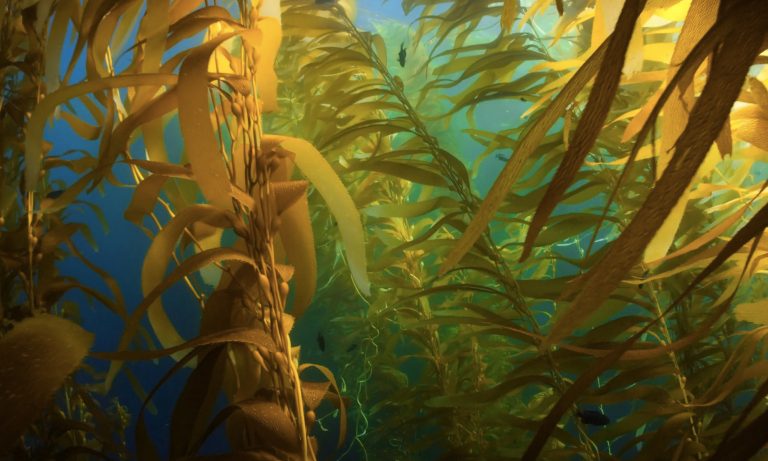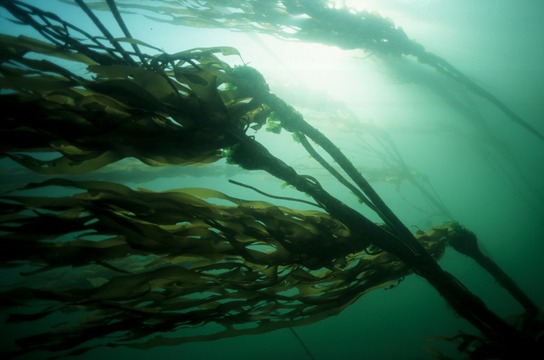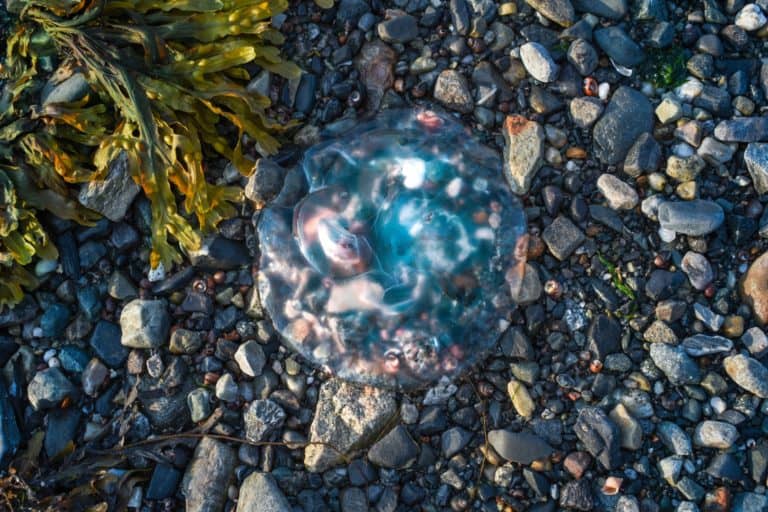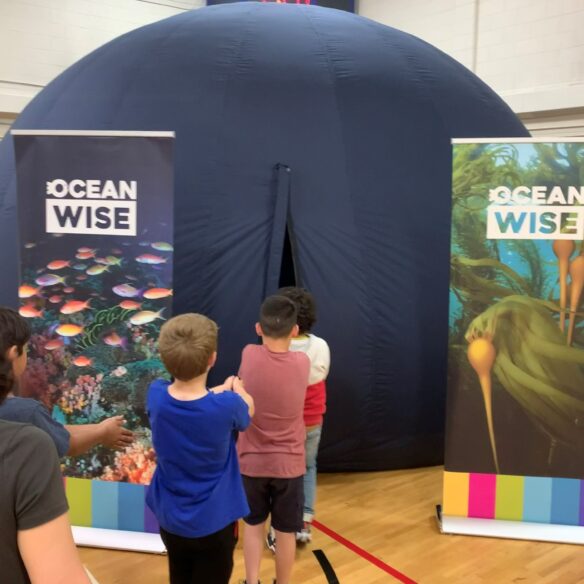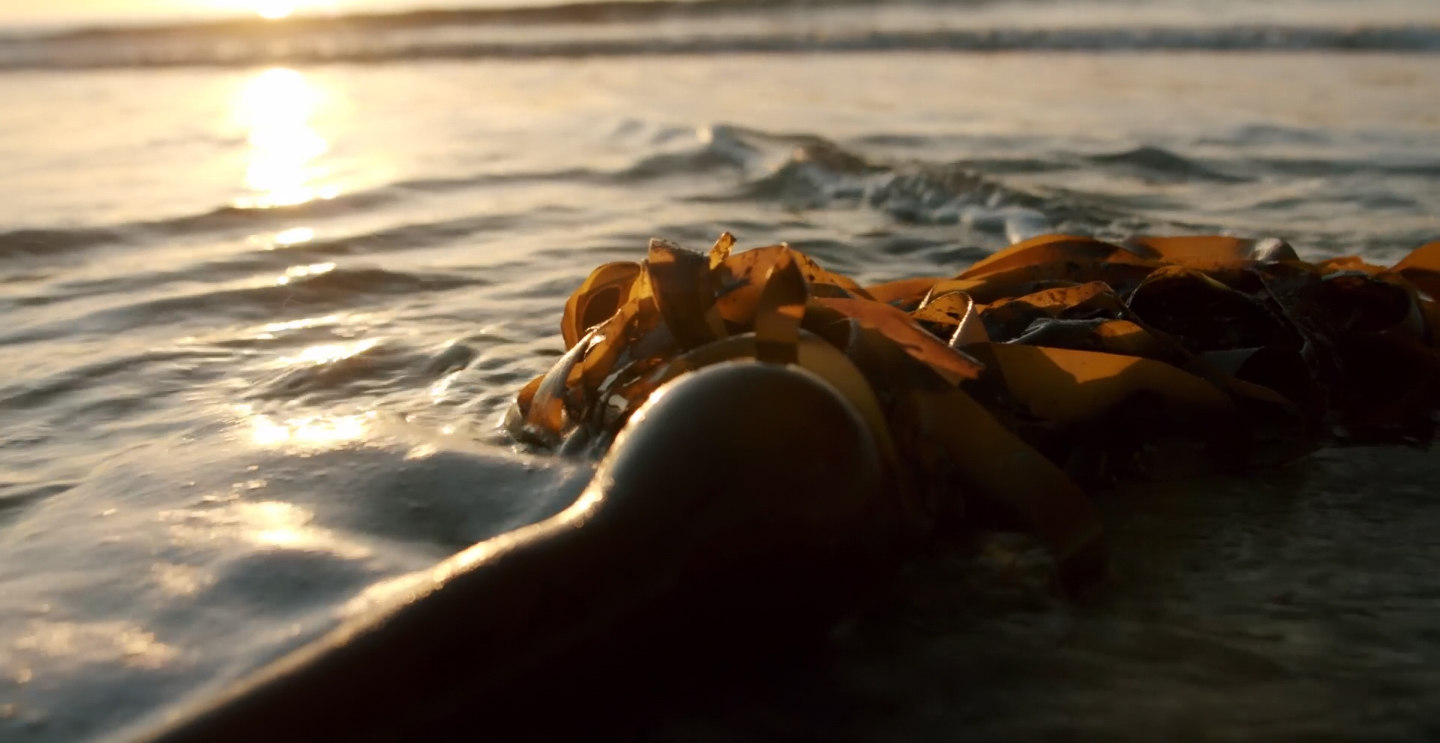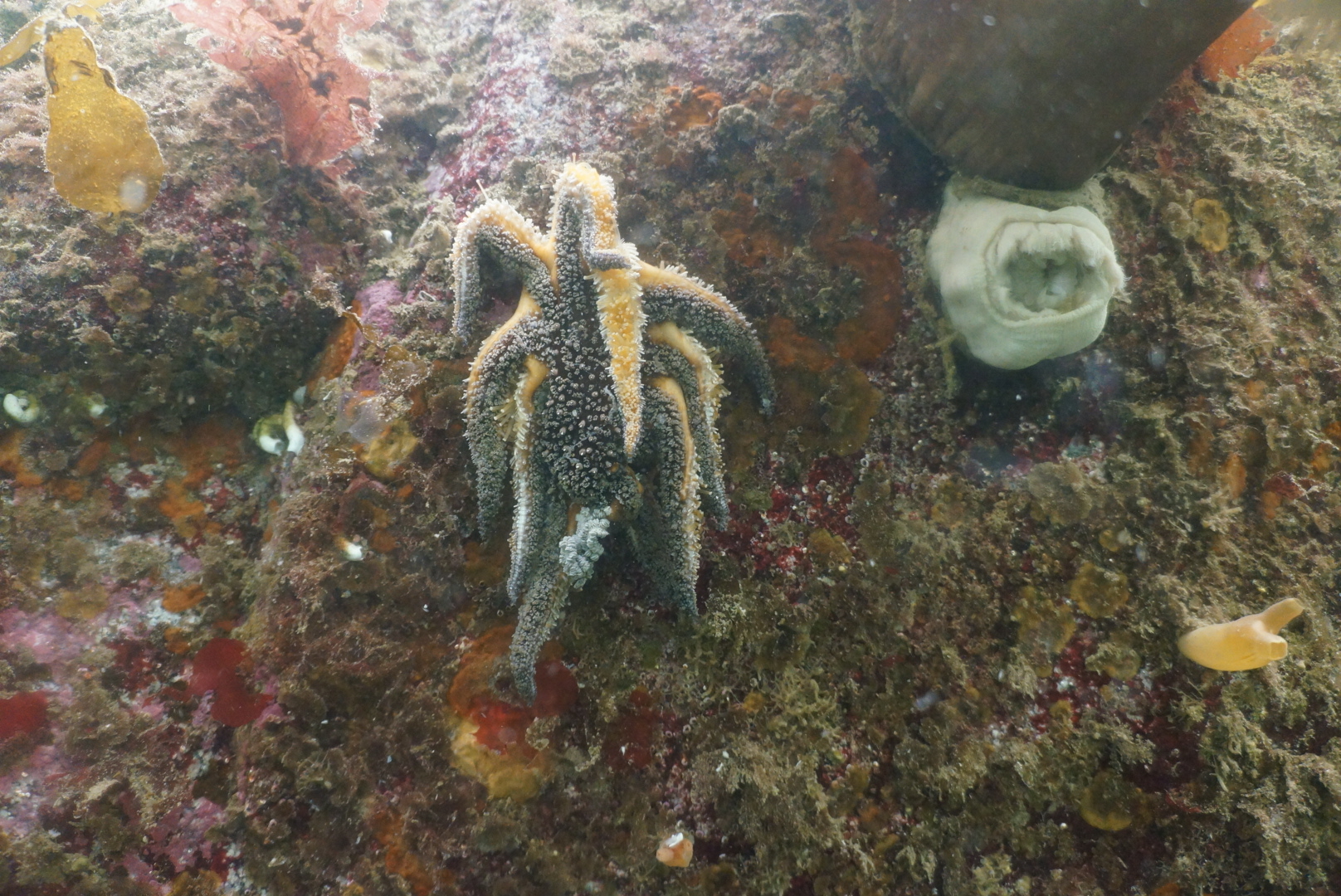
Decimation of Sea Star Species Leads to Howe Sound Urchin Barrens
October 14, 2021
Ocean Watch report details the cascading impacts of sea star wasting disease
Vancouver, Canada (October 14, 2021): In 2013, multiple outbreaks of Sea Star Wasting Disease (SSWD) decimated sea star species along the coast of the Pacific Northwest. Hit hard by SSWD the sunflower sea star (Pycnopodia helianthoides) saw losses of 99-100% in some populations. As a key predator in the area, the sunflower sea star’s decline coincided with an almost four-fold increase in green sea urchins in Atl’ḵa7tsem/Howe Sound in British Columbia. Now, nearly a decade later, with the species listed as critically endangered globally by the International Union for the Conservation of Nature, Canadian experts believe restoration of kelp forests through seaforestation and the listing of the sunflower sea star for protection under the federal Species at Risk Act is needed.
A new Ocean Watch spotlight report from Ocean Wise entitled Marine Biodiversity Loss: Epidemic Wipes out Majority of Sunflower Sea Stars takes a closer look at the cascading impacts of SSWD on sunflower sea stars and the potential for recovery and conservation.
Sunflower sea star population declines by nearly 90% in British Columbian waters
Multiple outbreaks of SSWD since 2013 have resulted in significant global and local declines of sunflower sea star populations. Supported by the input of researchers from 60 institutions spanning the Pacific Northwest coast, including Ocean Wise, the International Union for the Conservation of Nature (IUCN) declared the sunflower sea star critically endangered globally in 2020. Ocean Wise scientists contributed the longest temporal dataset, with over 50 years of data on sunflower sea stars collected along the coast of British Columbia.
In January researchers at Cornell University identified warming ocean temperatures as a key factor contributing to SSWD. The study found that as ocean temperatures increase due to climate change organic material and bacteria, which suck up oxygen, also increased. As a result, sea stars in this low-oxygen environment have difficulty breathing.
While not yet listed for protection in Canada experts across the country are currently working to better understand how we might protect and restore sunflower sea stars. Once completed this research will be submitted to Committee on the Status of Endangered Wildlife in Canada (COSEWIC) and the Species at Risk Act (SARA) in the hopes that sunflower seas stars will see greater protection.
Rise of green sea urchins leads to the destruction of kelp forest
Seemingly docile, sunflower sea stars are voracious carnivores insatiably eating sea urchins, fish, bivalves (e.g., clams, oysters and mussels), crustaceans (e.g., crabs, lobsters and shrimp) and gastropods (snails and slugs). Before dying off from SSWD sunflower sea stars played an important role in keeping urchin populations in check along the Pacific coast. Without this balance sea urchins can graze away kelp forests completely, leaving behind a vast rocky wasteland.
Kelp forests are important breeding grounds and nurseries for many fish and invertebrate species, such as rockfish, herring, crabs and prawns, as well as sea otters. They also play a role in countering the impacts of climate change by sequestering carbon and acting as an ocean acidification buffer.
Restoring kelp forests through seaforestation
With kelp forests vanishing across the Pacific Northwest, we are seeing decreases in biodiversity and changes to community structure throughout the surrounding ecosystem. Ocean Wise is looking to restore kelp forests at scale through in-water conservation efforts including urchin harvesting (removal of green sea urchins) and seaforestation (planting of kelp fronds).
Ocean Wise is exploring how diver-caught urchin fisheries in British Columbia might help to restore the ecosystem balance. By harvesting green sea urchins from areas previously well-populated by sunflower sea stars the expectation is that newly planted kelp fronds might flourish.
Working with experts in Barkley Sound, Ocean Wise and Canadian Kelp Resources, Ltd., a company that initiated kelp farming in North America in the 1980’s, is now using ‘green gravel’ to seed the ocean floor with giant kelp seedlings as part of the effort to create scalable solutions to kelp forest restoration.
What you can do:
Some things that individuals, organizations and governments can do to protect sunflower sea stars and restore kelp forests:
â Individuals can mitigate climate change through their personal actions to reduce their carbon footprint. This can help promote sunflower star recovery and decrease the probability of other wildlife disease outbreaks in the future.
â Governments should support ongoing research projects on SSWD, sea star conservation and kelp forest ecology and assess the need for additional studies.
â Governments and philanthropists should support and fund researchers and conservationists in Canada and the USA to continue to work on a sunflower star recovery and monitoring strategy.
â Governments and philanthropists should support and fund researchers and conservationists to restore important kelp forests around the globe.
To learn more, check out the full report
About Ocean Wise® Conservation Association
Ocean Wise is a globally focused conservation organization on a mission to protect and restore the world’s oceans. Through research, education, direct-action conservation and field projects, we empower communities to act for ocean health. We are focused on tackling three major ocean challenges: overfishing, ocean pollution and climate change. Ocean Wise is headquartered in Vancouver, British Columbia with initiatives across the world. Ocean.org
About Ocean Watch
Ocean Watch is an Ocean Wise Conservation Association program that examines many aspects of coastal ocean health. Keeping our coasts, oceans, and the species that dwell within them healthy, starts with understanding what is happening. Ocean Watch delves into what is happening in our coastal ocean environments, whether it be a topical ocean health issue happening right now, or a legacy ocean health issue that needs to be re-examined. Our aim is to produce independent, credible, and engaging information, and to recommend actions that can be taken to make our oceans healthier. We aim to inspire everyone to make positive decisions for healthy oceans.
Media Contact
Ocean Wise Public Relations
Ocean Wise Conservation Association
[email protected]
Posted October 14, 2021 by Nic Schulz
